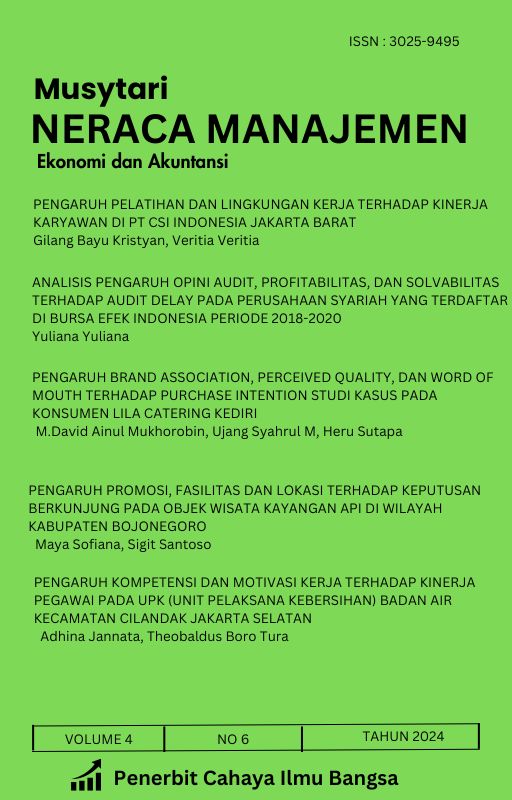STRATEGI INDONESIA DALAM MENGHADAPI DINAMIKA EKONOMI INTERNASIONAL: TINJAUAN TERHADAP KEBIJAKAN PERDAGANGAN LUAR NEGERI
Published 2025-06-18
Keywords
- Strategi perdagangan luar negeri,
- dinamika ekonomi internasional,
- diversifikasi pasar,
- diplomasi ekonomi,
- reformasi kebijakan
- proteksi sektor strategis,
- Foreign trade strategy,
- international economic dynamics,
- market diversification,
- economic diplomacy,
- policy reform,
- strategic sector protection ...More
How to Cite
Abstract
Dinamika ekonomi internasional yang semakin kompleks dan penuh ketidakpastian akibat krisis geopolitik, proteksionisme global, serta disrupsi rantai pasok pasca pandemi COVID-19 telah memaksa negara-negara berkembang, termasuk Indonesia, untuk merumuskan strategi perdagangan luar negeri yang lebih adaptif dan berkelanjutan. Penelitian ini bertujuan untuk menganalisis strategi Indonesia dalam merespons perubahan global melalui kebijakan perdagangan luar negeri yang mencakup diversifikasi pasar ekspor, penguatan diplomasi ekonomi multilateral, reformasi regulasi perdagangan, serta proteksi terhadap sektor-sektor strategis. Metode yang digunakan dalam penelitian ini adalah pendekatan kualitatif dengan metode studi pustaka, yang mengkaji berbagai dokumen kebijakan, literatur akademik, dan data sekunder relevan. Hasil kajian menunjukkan bahwa strategi perdagangan Indonesia telah berkembang ke arah yang multifaset dengan mengintegrasikan teori keunggulan kompetitif, rantai nilai global, dan kapabilitas dinamis. Digitalisasi sistem perdagangan seperti penerapan Indonesia National Single Window serta keterlibatan aktif dalam perjanjian dagang multilateral turut memperkuat posisi Indonesia dalam menghadapi tekanan eksternal. Di sisi lain, perlindungan sektor domestik melalui kebijakan hilirisasi dan reformasi struktural diarahkan pada peningkatan nilai tambah dan daya saing industri nasional. Penelitian ini menyimpulkan bahwa strategi perdagangan luar negeri Indonesia memiliki arah yang progresif, namun tetap menghadapi tantangan dalam menjaga keseimbangan antara keterbukaan pasar, inovasi, dan keberlanjutan. Temuan ini memberikan kontribusi konseptual dan praktis bagi perumusan kebijakan ekonomi luar negeri yang inklusif, tangguh, dan responsif terhadap dinamika ekonomi global.
The increasing complexity and uncertainty of the international economy—driven by geopolitical tensions, global protectionism, and post-pandemic supply chain disruptions—have compelled developing countries, including Indonesia, to formulate more adaptive and sustainable foreign trade strategies. This study aims to analyze Indonesia’s strategic response to global economic shifts through its foreign trade policy, focusing on four main pillars: export market diversification, strengthening multilateral economic diplomacy, trade regulation reform, and protection of strategic sectors. The research employs a qualitative approach using literature review methods, analyzing various policy documents, academic sources, and relevant secondary data. The findings indicate that Indonesia's trade strategy has evolved into a multifaceted framework that integrates the theories of competitive advantage, global value chains, and dynamic capabilities. Key initiatives such as the digitalization of trade systems through the Indonesia National Single Window and active participation in multilateral trade agreements have reinforced the country’s resilience amid global economic volatility. Furthermore, selective protection of domestic sectors through industrial downstreaming and structural reforms is directed at enhancing value addition and national industrial competitiveness. The study concludes that while Indonesia’s foreign trade strategy is progressive, it still faces challenges in balancing market openness, innovation, and sustainability. These findings offer conceptual and practical contributions to the formulation of inclusive, resilient, and globally responsive foreign trade policies.
References
- Bayne, N., & Woolcock, S. (2017). The new economic diplomacy: Decision-making and negotiation in international economic relations. Routledge.
- Badan Pusat Statistik. (2023). Statistik perdagangan luar negeri Indonesia 2023. https://www.bps.go.id
- Chesbrough, H. W. (2003). Open innovation: The new imperative for creating and profiting from technology. Harvard Business School Press.
- Gereffi, G. (2018). Global value chains and development: Redefining the contours of 21st century capitalism. Cambridge University Press.
- Gereffi, G., & Fernandez-Stark, K. (2016). Global value chain analysis: A primer. Duke University Center on Globalization, Governance & Competitiveness. https://dukespace.lib.duke.edu/dspace/handle/10161/12488
- Hill, M. (2014). The public policy process (6th ed.). Pearson Education.
- List, F. (1841). The national system of political economy. Longman, Brown, Green, and Longmans.
- Porter, M. E. (1990). The competitive advantage of nations. Free Press.
- Teece, D. J. (2007). “Explicating dynamic capabilities: The nature and microfoundations of (sustainable) enterprise performance”. Strategic Management Journal, 28(13), 1319–1350. https://doi.org/10.1002/smj.640

